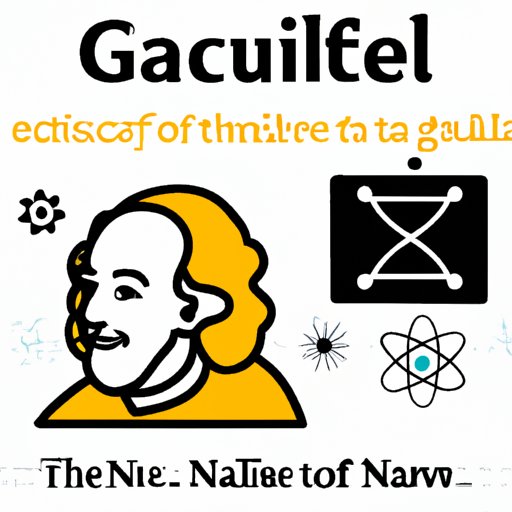Introduction
The term “pure science” is often used interchangeably with “natural science” and can be defined as any scientific field that studies the natural world and its components without any direct application or use. This includes fields such as physics, chemistry, biology, astronomy, and geology, among others. As such, pure sciences are focused on understanding the fundamental laws of nature, rather than applying them to practical problems or developing useful products or technologies.
Within the scope of pure sciences, there are several different branches that focus on different aspects of natural phenomena. For example, physics is the study of matter, energy, and the interactions between them, while chemistry focuses on the composition, structure, and properties of substances. Biology examines living organisms and their relationship to their environment, while astronomy explores celestial bodies and the cosmos. Geology is the study of the Earth’s physical features, including its rocks, minerals, and other geological processes.

History and Development of Pure Sciences
The study of pure sciences has a long and rich history, stretching back to ancient times. In the 4th century BCE, the Greek philosopher Aristotle wrote extensively about the natural world, and his work laid the foundation for many of the concepts in modern sciences. Similarly, the Islamic Golden Age saw significant advances in mathematics, astronomy, and medicine, which helped to shape the development of these sciences over the following centuries.
The Enlightenment period of the 17th and 18th centuries was a major turning point in the history of pure sciences. During this time, scientists such as Isaac Newton and René Descartes made groundbreaking discoveries in mathematics, physics, and astronomy. Their work laid the foundations for the development of modern sciences and helped to establish the basis for scientific inquiry.
In the 19th and 20th centuries, the development of pure sciences accelerated significantly. Scientists such as Albert Einstein, Marie Curie, and Stephen Hawking made major breakthroughs in their respective fields, helping to further our understanding of the natural world. Additionally, technological advancements such as the microscope and telescope allowed scientists to observe and analyze phenomena on a much smaller and larger scale than ever before.

Impact and Influence of Pure Sciences on Society
The impact of pure sciences on society is profound and wide-reaching. One of the most obvious effects is the development of new technologies, which has revolutionized the way we live and work. Many of the gadgets and devices we use today are the result of advances in pure sciences, from cell phones to computers to medical equipment.
Another significant impact of pure sciences is on education. The knowledge gained through research and experimentation in the fields of physics, chemistry, and biology has been incorporated into school curriculums around the world. This has helped to create a more informed and educated population, which is beneficial to both individuals and society at large.
Finally, the advancement of pure sciences has had a positive effect on the economy and social well-being of many countries. Research and development in the fields of science and technology have led to increased productivity and economic growth, while also providing new job opportunities. Additionally, advances in medical sciences have improved public health, leading to longer lifespans and improved quality of life for many people.
Contributions of Pioneers in Pure Sciences
Throughout the history of pure sciences, there have been many pioneers who made significant contributions to their respective fields. Some of the most notable include Isaac Newton, Galileo Galilei, and Marie Curie.
Isaac Newton is perhaps the most famous scientist of all time. His work in mathematics, physics, and astronomy laid the basis for modern scientific inquiry and helped to explain many of the laws of motion and gravity. His book Philosophiæ Naturalis Principia Mathematica, published in 1687, is considered to be one of the most influential works in the history of science.
Galileo Galilei is another important figure in the history of pure sciences. He made numerous contributions to the fields of astronomy, mathematics, and physics, including his observations of the moons of Jupiter and his improvements to the telescope. His work helped to disprove the geocentric model of the universe and paved the way for the development of modern astronomy.
Marie Curie was a pioneering physicist and chemist who made groundbreaking contributions to the fields of radioactivity and X-ray imaging. She was the first woman to win a Nobel Prize and is remembered for her tireless efforts in advancing the understanding of radiation and its effects on the human body. Her research opened up new possibilities in the fields of medicine and healthcare.
Conclusion
In conclusion, pure sciences are fields of study that investigate the natural world and its components without any direct application or use. These fields include physics, chemistry, biology, astronomy, and geology, among others. Throughout history, these sciences have undergone significant development and have made a huge impact on society, from technological advancements to educational reforms to economic and social benefits. Finally, the contributions of pioneers such as Isaac Newton, Galileo Galilei, and Marie Curie are still felt today, and serve as a reminder of the value of pure sciences to society.
(Note: Is this article not meeting your expectations? Do you have knowledge or insights to share? Unlock new opportunities and expand your reach by joining our authors team. Click Registration to join us and share your expertise with our readers.)
